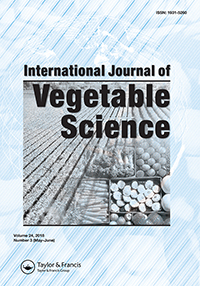Cowpea (Vigna unguiculata L. Walpers) leaves are an important nutrient source. Little is known about accession-specific leaf yield dynamics across recurrent harvests. The objectives of this study were to assess environmental impact on successive single leaf yields, assess genotypic differences in leaf yield dynamics, and determine suitability of statistical approaches for site specific selection to improve cowpea leaf yield. On-farm and on-station trials were conducted in two main cowpea-growing regions of Tanzania (Arusha and Kilimanjaro). Young, tender leaves were repeatedly picked from 11 accessions of the World Vegetable Center–Regional Center for Africa cowpea collection. To assess accession-specific leaf yield and leaf yield stability across seasons and locations stability variance (s2i), regression coefficient (bi), deviation mean square (d2i), and leaf yield reliability (RNi) were investigated. Significant genotypic effects for single leaf harvests were found only in Arusha on-station. Yield reliability, estimated as the likelihood to outperform a local check, was generally low. The RNi was correlated with stability parameters, but the coefficients varied more among locations than correlations of RNi with mean leaf yield per plant and harvest or those with test–check differences. The low probability of outperformance may indicate that selection for improved performance across subsequent leaf harvests will be very important, and possibly difficult, for prebreeding activities with the tested accessions.
Accession-specific effects of repeated harvesting edible cowpea leaves on leaf yield, stability, and reliability
Citation: Polreich, S.; Becker, H.C.; Maass, B.L. 2016. Accession-specific effects of repeated harvesting edible cowpea leaves on leaf yield, stability, and reliability. International Journal of Vegetable Science. (USA). ISSN 1931-5260. 22(3):295-315.
2016-12-13
GENETICS, GENOMICS AND CROP IMPROVEMENT SCIENCES GGCI
journal_article

